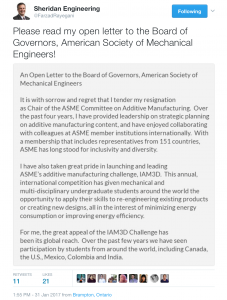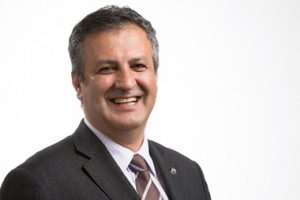BY BRADLEY NORTHCOTE
An acclaimed member of Sheridan’s Davis Campus faculty has a strong message for students about President Donald Trump’s controversial travel ban.
Dr. Farzad Rayegani is an Associate Dean and professor at Sheridan’s School of Mechanical and Electrical Engineering Technology, where he developed an applied research program for Halton and Peel regions. He is also Director of Sheridan’s Centre for Advanced Manufacturing and Design Technologies (CAMDT).
He was also Chair of the American Society of Mechanical Engineers (ASME). That was until one week ago, when he resigned in an open letter addressed to the group’s board of directors, saying the spirit of the group and its annual 3D-printing challenge, IAM3D, was threatened by Trump’s banning of immigration from seven Muslim-majority countries.
“As a Canadian citizen of Iranian origin, it runs counter to my values and principles to continue my role in IAM3D and to serve as Chair on Additive Manufacturing for ASME, an organization whose stated purpose…will be sorely constrained by the current political climate in the U.S.,” the note said.

Reached by phone at his Davis Campus office, Rayegani said of the contest, “It’s not about additive manufacturing. It’s about creating a platform for knowledge transfer…I resigned to send a message [that our mandate was] international cooperation.”
He hopes an American colleague will keep the contest going, but he felt he had to step down to take a stand.
Rayegani says it’s important to stress that his decision wasn’t personal. As an EU, Iranian and Canadian citizen, the travel ban doesn’t prevent him from travelling. It does, however, have a chilling effect on international cooperation by his colleagues and students through the message it sends to U.S. citizens.
He says it shows a loss of perspective by the U.S. government about the importance of cross-border cooperation for technological innovation.
The Trump administration, for its part, has criticized media’s description of his travel ban as a “Muslim ban.” Speaking to media on Sunday, Trump said, “This is not about religion – this is about terror and keeping our county safe. There are over 40 countries worldwide that are majority Muslim that are not affected by this order.”
Critics say it still matters that each of the countries targeted are majority Muslim, and the Trump Organization happens to have business in several of the untouched countries, including Saudi Arabia and Turkey, despite security concerns surrounding them.
Reince Preibus, Trump’s White House Chief of Staff, said Sunday that more countries may be added, but he has yet to say which ones.
Rayegani hopes Canada will take the opportunity to present itself as a business-friendly alternative.
“Canada must embrace the opportunity to build a multidisciplinary and multinational environment,” he says.
While Canada could lure businesses as the Trump administration resists legal challenges to the travel ban, the U.S. tech industry has many voices raised against the ban. Among them, CEOs from tech giants Google, Facebook and Microsoft have been outspoken in their criticism.
“Canada must embrace the opportunity to build a multidisciplinary and multinational environment.”
Rayegani has another concern about the tone of the Trump administration. Trump’s election came in part from his appeal to rust belt workers through a promise to ““bring back millions of jobs [and] higher wages.” Canadian research from the Mowat Centre suggests traditional manufacturing jobs face cuts due to automation brought by new technology.

Rayegani cautions Canadians who might share such fears of innovation. He says it improves rather than threatens the job market by “transferring” jobs from manual to skilled labour and improving both jobs and consumers’ quality of life. He says he resigned from ASME in the hope of raising awareness of how Trump’s travel ban threatens innovation and how innovation is important for both the Canadian and American economies.
He says the response to his open letter has been inspiring.
“The response from Canadians and Americans was very encouraging. They were hoping more experts, scientists and educators would follow suit . . . My LinkedIn, Twitter and email accounts [have been flooded with] encouragement.”
While he’s heard from international colleagues, faculty and students, he feels his resignation as chair of ASME is part of a responsibility to students most of all.
“I am in a position of power as [ASME] chair . . . In a position of power, you have to speak up. Nobody heard my students. With power, I can be their voice.”
